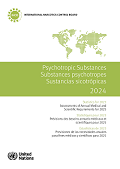INCB launches its technical report psychotropic substances 2024

VIENNA, 11 March 2025 -The International Narcotics Control Board (INCB) has released its technical report, 'Psychotropic Substances 2024', presenting consolidated global data on the licit manufacture, trade, and consumption of internationally controlled psychotropic substances for 2023.
The number of psychotropic substances under international control continues to grow. As at the end of 2023, 170 psychotropic substances had been placed under international control. In March 2023, the Commission on Narcotic Drugs included three substances in schedule II of the 1971 Convention by, namely ADB-BUTINACA, alpha-PiHP and 3-methylmethcathinone. Most psychotropic substances manufactured and consumed are sedative-hypnotics, anxiolytics and anti-epileptics, including barbiturates and benzodiazepines. The other significant group of psychotropic substances licitly manufactured comprises stimulants, mostly amphetamines and methylphenidate.
Reporting performance improved notably in all regions in 2023, including with regard to consumption data, which is essential in enabling the Board to assess the availability of psychotropic substances for medical and scientific purposes.
In 2023, the total global manufacture of internationally controlled psychotropic substances remained similar to previous years. Among all substances, barbiturates and benzodiazepines accounted for the bulk in terms of gross weight. Phenobarbital was by far the most manufactured substance globally, followed by methylphenidate, with a record level of manufacture recorded for 2023. Reported manufacture of meprobamate fell significantly in 2023.
The report also shows that global manufacture of tetrahydrocannabinol (THC), six isomers of which are included in Schedule I of the 1971 Convention, remains limited. On the other hand, the manufacture and global stocks of delta-9-tetrahydrocannabinol (delta-9-THC), which is controlled under Schedule II, increased in 2023.
The report notes that monitoring the availability of psychotropic substances for medical and scientific use continues to be a challenge. Although 111 countries and territories did provide consumption data for at least one psychotropic substance in 2023, reporting rates at the regional level varied widely and the gaps between countries' consumption data remain significant and hinder the ability of the international community to ensure equitable access to internationally controlled psychotropic substances for medical and scientific purposes.
Data provided shows that consumption levels of the most widely traded benzodiazepines such as alprazolam, diazepam, clonazepam, and midazolam continue to increase, though consumption levels vary globally.
With respect to the consumption of barbiturates, levels of overall consumption of phenobarbital are higher in 2023 than in previous years but with significant disparities in consumption levels between and within several regions. Overall consumption patterns for methylphenidate have increased significantly in 2023, in nearly all of the countries that provided data. The report also shows that the system of assessments for psychotropic substances is almost universally adhered to by countries. In 2023, around 4,500 annual assessments and supplements to assessments were received and processed by the Board, representing around 2,500 tons of psychotropic substances. Diazepam, midazolam, clonazepam, phenobarbital and alprazolam are the top 5 psychotropic substances assessed worldwide.
''Psychotropic Substances 2024' is now available for download.
***